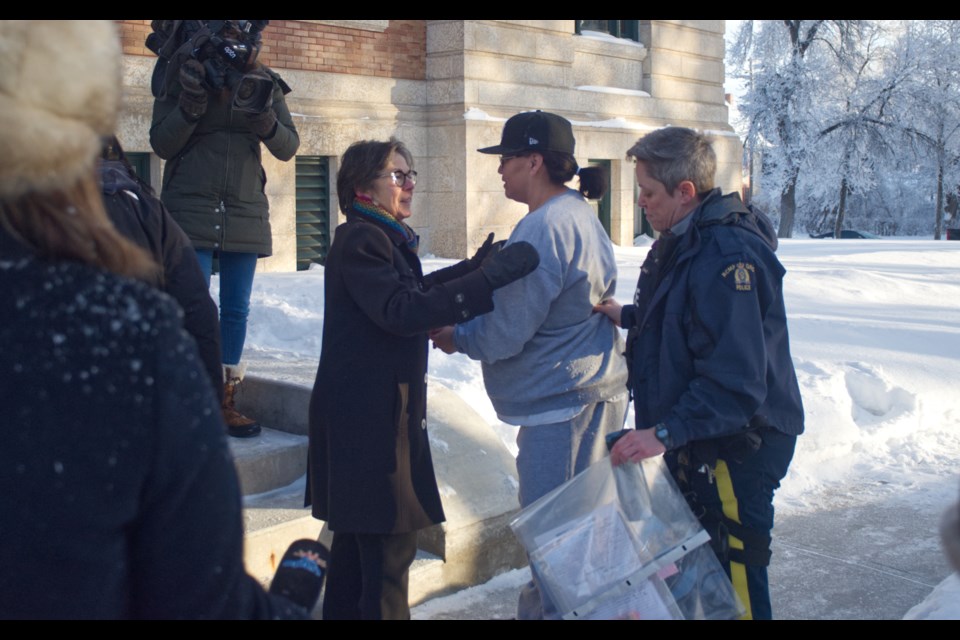YORKTON – “What we haven’t heard much about is Mr. Joe Dolff or the people that he loved and the people that he left behind,” said Crown Prosecutor Kelly Kaip in her opening statement, opposing release of the Quewezance sisters.
She was responding to arguments presented by defence counsel, which took the entire morning on Jan. 18 in Yorkton King’s Bench Court. The two-day bail hearing was held to decide whether or not the sisters could be conditionally released as they await a ministerial review of their conviction.
“It’s been a long 30 years for his family,” Kaip continued. “He’s missed weddings, births, graduations. They miss him because three people wanted $700 from him. That’s ultimately what this crime is about - $700.”
Kaip went on to explain how she has spent time with the family of Anthony Joseph Dolff during the proceeding, and “they continue to be profoundly affected by this crime.”
“That’s his final hours,” said Kaip. “We can think about how terrified he must have been.”
Members of Dolff’s family were in tears as Kaip went on to detail some of the events of Feb. 24, 1993 when Odelia and Nerissa Quewezance along with their then 14-year-old cousin attended Dolff’s home.
Court heard that on that fateful night, the four people drank, visited, and at one point Odelia Quewezance discovered an envelope containing $700. The sisters and their cousin then requested Dolff drive them home, and as he approached the highway, the 70 year-old realized the envelope was missing. He told the group that if he could not find it, he would call police. Upon arrival back at Dolff’s residence, the trio helped him search for the missing money before attacking the man, and ultimately taking his life. Keys to Dolff’s vehicle were recovered by the trio, the scene was covered with “some sort of white powder in water,” then the house was padlocked.
The sisters and their cousin then drove to their grandmother’s house.
Citing the route taken in the Colin Thatcher Supreme Court of Canada decision, Kaip concluded, “we treat those who commit the offence as indistinguishable as those who aid or abet.” She noted while it was likely the particular actions of the sisters’ cousin that caused death in this situation “it was the Crown’s theory … that it was a group attack on Mr. Dolff.”
Kaip pointed again to parole breaches by both sisters, noting that “the sisters have some hope now, so they’re more likely to be compliant in the community.”
“What hasn’t been discussed, is what happens if they fail?” Kaip asked, adding that residual public safety concerns should be considered. She spoke generally of how people serving life sentences can be released into the community on parole, satisfied that the risk can be managed safely.
Kaip said much has been said about the Quewezance sisters serving 30 years in jail, effectively seen by the public eye as having served enough time behind bars. She also spoke on how Courts across the country “are tasked with the enforcement of the law as set out in the Criminal Code,” that sentences seen as “excessive” ought to be directed to Parliament instead of the courtroom.
“In this particular case, we have a mandatory punishment and that is life,” she said, explaining that committing a first or second-degree murder in Canada is a life sentence. In terms of functionality, “for the duration of your life, you are subject to the scrutiny of the parole board in terms of delivery.”
Kaip concluded with stating her confidence in the process regarding the Minister of Justice and the Parole Board of Canada to supervise the sisters, submitting that bail be denied.
Justice Donald Layh, after hearing proposed release conditions from the Defence counsel and concerns raised by the Crown, questioned if there might be some middle ground to be reached between the two positions.
“We want Odelia and Nerissa out,” said James Lockyer, the sisters’ lawyer, adding that they would be amiable to following conditions. While both Odelia and Nerissa Quewezance have general plans in place of where they would reside should release be granted, Layh wanted to see something more specific and structured.
Ultimately, he directed Defence counsel to provide a detailed plan of action to the Crown, then reconvene via teleconference on Feb. 23. Layh was clear that he would still be reserving a decision regarding release on that date, that he’s seeking more measurable and specific details.
“We had a good hearing for two days before Mr. Justice Layh. We’re very hopeful - Odelia and Nerissa are very hopeful - that he may release them on bail,” Lockyer told reporters after court had adjourned. “But we’re going have to wait six to eight weeks before we get his decision.”
The sisters, who have maintained their innocence since 1993, are hopeful for a positive outcome.
“It’s sad that we couldn’t be free today, but today I’m still keeping on with hope and faith,” said Odelia Quewezance.
— for more from Crime, Cops and Court.





